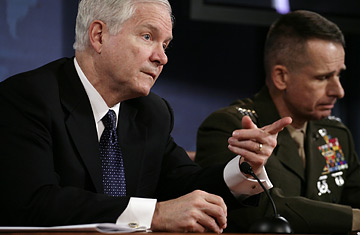
U.S. Secretary of Defense Robert Gates, left, speaks during a media roundtable with General Peter Pace, Chairman of the Joint Chiefs of Staff, at the Pentagon in Washington March 7, 2007.
But far more important is what the hara-kiri hat trick shows about Robert Gates, the new secretary of defense, and the new kind of leadership he has brought to the Pentagon. "I don't have very much patience for people that don't step up to the plate in terms of addressing problems that are under their responsibility," Gates said shortly before he ordered Harvey to submit his resignation papers.
None of these heads would have rolled under Gates' predecessor, Donald Rumsfeld, Pentagon officials suggest. Rumsfeld was loyal to a fault, and generally would back subordinates rather than sack them, since he would view that as tantamount to a rebuke of his own stewardship. He applied this kind of pre-emptive backing to big mistakes — like the poor execution of the military's occupation of Iraq — and lesser ones too, like the Abu Ghraib prison scandal.
While such allegiance has its merits, it does begin to fray amid a long, drawn-out war. Rumsfeld notoriously refused to see the forces arrayed against the U.S. as guerrillas — when even his military commanders were using the word. Then he refused to agree that a civil war was ravaging the country. All the bickering did was to give his Washington foes a fat, juicy target to criticize — and his attitude curbed the military's enthusiasm to explore new and different ways of grappling with the growing insurgency, Pentagon officials say.
But Gates' appointment seems to have freed up these kinds of logjams. Without Rumsfeld's baggage or background, Gates — whom some in the Pentagon are calling the "anti-Rumsfeld" — is free to disagree with policies and personnel that he inherited. "Gates seems to want to hold people accountable," says Lawrence Korb, Pentagon manpower chief during the Reagan administration. "Rumsfeld threatened a lot of people, but as far as we know never got rid of anybody for any mistakes."
Yet Robert Scales, a retired Army major general, says Gates will have to move much more gingerly before taking similar action against any officers carrying out the Iraq war strategy. "He's new to the job, and to the art of war," says Scales, a historian and former head of the Army War College. "Given the nature and character of this war, I think he's being a bit more measured overseas." He adds: "Military medicine and soldier care are things that are pretty easy to understand. But when you get into the complexities of a counterinsurgency, even those who are the old hands at it have trouble trying to understand it."
While Rumsfeld was in charge as the Pentagon began initial planning for the "surge" of 21,500 troops now being added to U.S. forces in Iraq, there already are reports that the military is developing a Plan B if the surge strategy fails. According to Monday's Los Angeles Times, Pentagon officials are weighing the wisdom of pulling out combat forces and relying more on the training of Iraqi forces to extricate U.S. troops from Iraq. It could resemble the U.S. strategy in El Salvador in the 1980s, when U.S. troops were dispatched to that Central American nation to train its fighting forces but didn't get involved in the conflict themselves. Whatever policy the U.S. eventually endorses, Gates — unlike Rumsfeld — won't have to cast a nervous eye into his own rearview mirror and wonder about how Congress and the press might react to such a change in strategy. "Gates is in great shape," Korb says, "because he wasn't here when these decisions were made."
